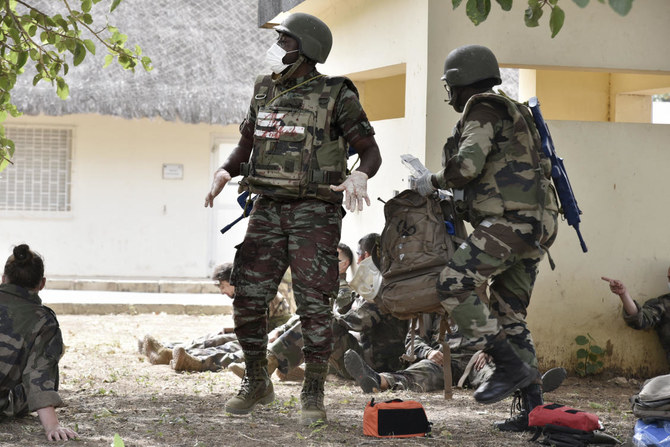DAKAR: Separatist rebels have killed four Senegalese soldiers and are holding seven hostage after a clash on the border between Senegal and The Gambia last week, the Senegalese army said in a statement.
Three soldiers died in the fighting on January 24 between the Senegalese army and rebels from the Movement of Democratic Forces of Casamance (MFDC), it said late Monday. A fourth died from wounds several days later.
Seven soldiers are being held hostage by the MFDC, and all are “alive and in good health,” the army said.
The MFDC is behind a low-intensity breakaway conflict in Senegal’s southern region of Casamance that dates back to 1982 and has claimed several thousand lives.
A previous tally said two soldiers were killed and nine were missing, but the army said all were now accounted for.
“There are no more missing persons,” it said in its statement.
The soldiers were part of the peacekeeping mission from the West African bloc ECOWAS in The Gambia, which is known as ECOMIG.
Comprising mainly Senegalese soldiers, ECOMIG was deployed to The Gambia in January 2017 when former dictator Yahya Jammeh refused to cede power after losing a presidential election.
The clashes took place as soldiers were on an operation to combat illegal logging on the border with The Gambia, the army said last week.
Casamance was a Portuguese possession for several hundred years until it was ceded to colonial France in 1888, becoming part of Senegal after the country gained independence in 1960.
The region, which has a distinct culture and language, is separated geographically from the rest of Senegal by the Gambia River, around which lies the tiny state of The Gambia.
Rebels kill 4 Senegalese soldiers, hold 7 hostage in The Gambia
https://arab.news/j22ah
Rebels kill 4 Senegalese soldiers, hold 7 hostage in The Gambia

- The soldiers were part of the peacekeeping mission from the West African bloc ECOWAS in The Gambia
- The clashes took place as soldiers were on an operation to combat illegal logging on the border with The Gambia
EU leaders begin India visit ahead of ‘mother of all deals’ trade pact

- Antonio Luis Santos da Costa, Ursula von der Leyen are chief guests at Republic Day function
- Access to EU market will help mitigate India’s loss of access to US following Trump’s tariffs
New Delhi: Europe’s top leaders have arrived in New Delhi to participate in Republic Day celebrations on Monday, ahead of a key EU-India Summit and the conclusion of a long-sought free trade agreement.
European Council President Antonio Luis Santos da Costa and European Commission President Ursula von der Leyen arrived in India over the weekend, invited as chief guests of the 77th Republic Day parade.
They will hold talks on Tuesday with Prime Minister Narendra Modi at the EU-India Summit, where they are expected to announce a comprehensive trade agreement after years of stalled negotiations.
Von der Leyen called it the “mother of all deals” at the World Economic Forum in Davos last week — a reference made earlier by India’s Commerce Minister Piyush Goyal — as it will create a market of 2 billion people.
“The India-EU FTA has been a long time coming as negotiations have been going on between the two for more than a decade. Some of the red lines that prevented the signing of the FTA continue to this date, but it seems that the trade negotiations have found a way around it,” said Anupam Manur, professor of economics at the Takshashila Institution.
“The main contentious issue remains the Indian government’s desire to protect the farmers and dairy producers from competition and the European Union’s strict climate-based rules and taxation. Despite this, both see enormous value in the trade deal.”
India already has free trade agreements with more than a dozen countries, including Australia, the UAE, and Japan.
The pact with the EU would be its third in less than a year, after it signed a multibillion CEPA (comprehensive economic partnership agreement) with the UK in July and another with Oman in December. A week after the Oman deal, New Delhi also concluded negotiations on a free trade agreement with New Zealand, as it races to secure strategic and trade ties with the rest of the world, after US President Donald Trump slapped it with 50 percent tariffs.
The EU is also facing tariff uncertainty. Earlier this month Trump threatened to impose new tariffs on several EU countries unless they supported his efforts to take over Greenland, which is an autonomous region of Denmark.
“The expediting factor in the trade deal is the unilateral and economically irrational trade decisions taken by their biggest trading partner, the United States,” Manur told Arab News.
Being subject to the highest tariff rates, India has been required to sign FTAs with other major economies. Access to the EU market would help mitigate the loss of access to the US.
The EU is India’s largest trading partner in goods, accounting for about $136 billion in the financial year 2024-25.
Before the tariffs, India enjoyed a $45 billion trade surplus with the US, exporting nearly $80 billion. To the EU’s 27 member states, it exports about $75 billion.
“This can be sizably increased after the FTA,” Manur said. “Purely in value terms, this would be the biggest FTA for India, surpassing the successful FTAs with the UK, Australia, Oman and the UAE.”














